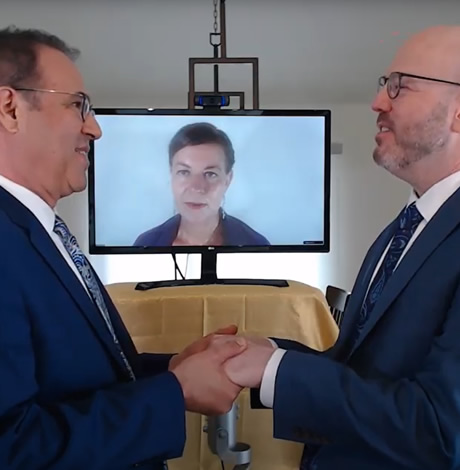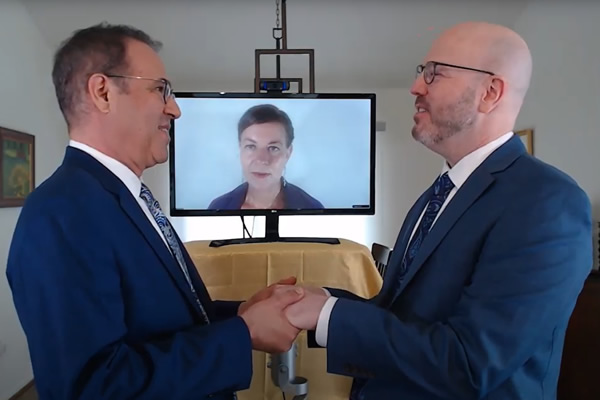Arts & Entertainment
Local gay couple proceeds with wedding plans despite lockdown
Family and friends gather virtually to celebrate same-sex nuptials


When Harry met Brian in 2015, the U.S. Supreme Court had just legalized same-sex marriage in all 50 states. Five years later around their kitchen table they agreed they were going to be damned if a pandemic stopped them from exercising that right.
“I played a lot of weddings,” says D. Brian Lee, a 58-year-old musician and definitely the feistier of the two, having been out since he was a teen. “I felt so down on the institution because it was never going to be me, but now we’ve won.”
“It was most important to us for people to honor and witness our wedding,” says Harry Fox, a 62-year-old health care administrator who had been married previously to a woman for 20 years. He had to overcome his own internalized homophobia to find strength and happiness.
On Saturday, April 25 Lee and Fox held their wedding virtually and became one of many couples around the world who didn’t let COVID-19-induced stay-at-home orders lockdown their love.
Internationally, the Singapore parliament is even considering a bill to further legalize virtual marriages during the crisis, according to The Straits Times.
In the U.S., virtual weddings via YouTube, Zoom and other conferencing platforms are becoming so prevalent that The Wedding Spot blog gives a detailed how-to for planning one.
NPR also reports New York Gov. Andrew Cuomo (D) signed an executive order on April 18 that allows clerks to perform wedding ceremonies via video conferencing platforms and for couples to get their marriage licenses remotely. And a quick Twitter search of the #ZoomWedding hashtag will find other creative couples taking advantage of similar marriage expansions in their areas.
Aaron Tax of SAGE, an LGBTQ senior advocacy organization, is not surprised that many choose the legal protections of marriage during a health crisis.
“Marriage may provide psychological benefits and more tangible benefits like economic security and certain legal rights to couples,” he says. “There really is no shorthand for saying ‘my wife’ or ‘my husband’ when an emergency arises and you want to explain the nature of your relationship.”
Fox agrees. When he was separated from his wife and had begun dating Lee, she became stricken with cancer. He admitted when he went to the hospital with their son, now 23, to visit her there was a certain legitimacy and “straight privilege” that made things easier for them during a difficult time.
“I think there’s a tremendous difference in the eyes of the world between a married couple and those who are living together,” Fox says. “And it plays out in the hospital room. There are significant rights in this culture that marriage confers and (Brian and I) want to be there for each other without anyone questioning that we have a right to be there.”
Lee also remembers seeing “unmarried partners being locked out of hospital rooms” of dying loved ones during the height of the HIV/AIDS crisis in the 1980s. He recalled this as a dark time filled with “some very inhumane treatment,” and this moved him to respect the institution of marriage.
That’s why he insisted that Fox divorce his wife before moving in with him.
“That was a trying and difficult time,” Fox says. “It was important for me to help my wife, but Brian was clear that I needed to be divorced before we moved in together.”
Fox’s wife eventually died, though she did get a chance to meet Lee before she died. The two of them had a quiet conversation while Fox made dinner in the other room. Later they moved together into the rented house they enjoy now in Potomac, Md., and their traditions of kitchen table conversations began.
“We meet every morning and every evening at this table to talk,” Fox says. “When you think about being with someone for the rest of your life, if it’s not fun to talk to the other person, you shouldn’t be with them.”
Lee was more impassioned in his agreement.
“I don’t want to have to pry the book open with a partner,” he says. “But with Harry, it’s very easy.”
However, it wasn’t so easy in the beginning as Fox was still struggling with his sexuality. Unlike Lee, he came out in his 50s and there were a few conditioned beliefs he had to lay to rest.
“In the beginning of our relationship, there was my own internalized homophobia,” Fox says. Sure, he had been married before, but that was in a traditional Jewish ceremony. “Did I see myself married to another man? Do I see myself kissing another man in public?”
As a musician, Lee calls Fox’s anxieties a form of “stage fright” which he still sees in his partner time and again.
“There have been times when I feel that if Harry is feeling a little anxious about something, I’ll say, ‘Ah, he’ll get through it.’ It just takes time and talking.”
And talking is something they’ve done plenty of over the years. As the two of them continued to date and their bond grew, Fox came out to more family and friends.
“But I felt I needed to come out at work,” he says. “Since work was such a large part of my life, in order to feel like an integrated human being and to get rid of the internal compartments I had maintained throughout my adult life.”
This was a difficult decision for him since at the time Fox was the chief information officer for a large health care insurance provider and responsible for over 2,500 employees. And from a legal standpoint, the U.S. Supreme Court is still weighing whether or not it is unconstitutional for employers to fire workers based on sexual orientation or gender identity.
Still, he knew then that he wanted Lee to be a part of his life. All of it.
“After I came out at work, I took Brian as my date to a dinner event with work colleagues,” Fox says, still sounding a little surprised that everything worked out so well. “I was also invited to join the board of Whitman-Walker Health.”
Fox says coming out fully swept away a lot of his remaining internalized homophobia and became a “very powerful life-changing experience.”
Fox and Lee felt their shared experiences together strengthened their resolve to get married, not just as an act of social justice but because they loved one another and were growing together. Then COVID-19 hit.
It was time for another discussion around the kitchen table.
“We talked about cancelling the physical wedding, but it took such a long road to get here,” Fox says. “In the real world the restrictions will ease up slowly, and there probably wouldn’t be another time to get people to fly in until later next year.”
Both he and Lee had already lost older family members and feared more wouldn’t last long enough to see them married. Lee added that when you hit your middle years, you just don’t know how much time older family members have left. Finally, they decided, “there will never be a perfect time … let’s just do it.”
“And I know people in our social circles love our parties,” Lee says. “And this was going to be the ultimate party.”
Fox and Lee have IT backgrounds and were familiar with the technology needed to pull off a virtual wedding. They decided to live-stream the ceremony on YouTube and hold the virtual receiving line via Zoom while sending out wedding cupcakes to family and friends.
“We did a butt-load of tests,” Lee says. “We had a dry run to make sure everyone could connect and with sound. I set up YouTube lives before at my other job. I still kept praying the internet keeps working.”
They had gotten their marriage license prior to the pandemic and its social distancing restrictions and business closures. They looked into Maryland marriage laws and found a confusing passage they reasoned meant the officiant needed to be physically “in the county in which” the marriage license is issued.
So their officiant, Hanna Nielsen-Jones, arranged for another officiant to marry them an hour before their virtual wedding, in their driveway — and six feet away.
The ceremony was posted on YouTube which used multiple layers of technology, to include the Nielsen-Jones officiating via video to the couple who then projected themselves via video for their guests to view. The virtual receiving line followed where family and friends expressed their warm wishes via Zoom and toasts were shared.
“I liked it all. With all of the things we were afraid could go wrong, nothing went wrong,” Fox says. “My son spoke and it was really lovely.”
“Most of the people dressed up like they were going to a real wedding,” Lee says. “And it looked fabulous. We drank a lot of champaign on this end also.”
Despite all of the fear and the obstacles, the newlyweds said it was worth it to be creative and have their wedding rather than cancel it. Right now their “honeymoon” consists of their nightly walk through their diverse neighborhood as their permitted lockdown activity. They agree it feels a little different with the rings on their fingers though they don’t advertise their new status with their neighbors.
But Lee holds out hope for a two-week trip to Spain.
“We hope to get our butts back to Barcelona,” he says, though he knows it probably wouldn’t be this summer.
Out & About
The Rare Book Fair is coming to D.C.
Over 35 antiquarian booksellers from across the country to attend

The Capital Rare Book Fair will bring more than 35 antiquarian booksellers from across the country to D.C. from Friday, May 3 to Sunday, May 5 at the historic University Club at 1135 16th St., N.W.
This year, the fair will take over two floors in the illustrious mansion on 16th Street and showcase thousands of beautiful, notable, and rare books, maps, and historic documents from around the globe. Exceptional examples that will be offered include leaf 27 of a 40-leaf xylographic Biblia pauperum, a picture Bible from 1465 for $85,000 from Bruce McKittrick Rare Books, among many other intriguing selections.
Tickets are $50 and more information is available on the event’s website.

Friday, April 19
Center Aging Friday Tea Time will be at 2 p.m. on Zoom. This is a social hour for older LGBTQ adults. Guests are encouraged to bring a beverage of choice. For more information, email [email protected].
Go Gay DC will host “Drag Pageant” at 8 p.m. at Freddie’s Beach Bar and Restaurant. Net proceeds from this event will benefit EQUALITY NoVa, the local nonprofit organization dedicated to advancing equality in Northern Virginia. Attendance is free and more details are available on Eventbrite.
Saturday, April 20
LGBTQ People of Color Support Group will be at 1 p.m. on Zoom. This peer support group is an outlet for LGBTQ People of Color to come together and talk about anything affecting them in a space that strives to be safe and judgment free. For more details, visit thedccenter.org/poc or facebook.com/centerpoc.
Go Gay DC will host “LGBTQ+ Brunch” at 11 a.m. at Freddie’s Beach Bar & Restaurant. This fun weekly event brings the DMV area LGBTQ community, including allies, together for delicious food and conversation. Attendance is free and more details are available on Eventbrite.
Sunday, April 21
Go Gay DC will host “LGBTQ+ Dinner” at 7 p.m. at Federico Ristorante Italiano. Attendance is free and more details are available on Eventbrite.
AfroCode DC will be at 4 p.m. at Decades DC. This event will be an experience of non-stop music, dancing, and good vibes and a crossover of genres and a fusion of cultures. Tickets cost $40 and can be purchased on Eventbrite.
Monday, April 22
Center Aging: Monday Coffee & Conversation will be at 10 a.m. on Zoom. This is a social hour for older LGBTQ adults. Guests are encouraged to bring a beverage of their choice. For more details, email [email protected].
Tuesday, April 23
Pride on the Patio Events will host “LGBTQ Social Mixer” at 5:30 p.m. at Showroom. Dress is casual, fancy, or comfortable. Guests are encouraged to bring their most authentic self to chat, laugh, and get a little crazy. Admission is free and more details are on Eventbrite.
Genderqueer DC will be at 7 p.m. on Zoom. This is a support group for people who identify outside of the gender binary. Whether you’re bigender, agender, genderfluid, or just know that you’re not 100% cis. For more details, visit genderqueerdc.org or Facebook.
Wednesday, April 24
Job Club will be at 6 p.m. on Zoom. This is a weekly job support program to help job entrants and seekers, including the long-term unemployed, improve self-confidence, motivation, resilience and productivity for effective job searches and networking — allowing participants to move away from being merely “applicants” toward being “candidates.” For more information, email [email protected] or visit [email protected].
Asexual and Aromantic Group will be at 7 p.m. on Zoom. This is a space where people who are questioning this aspect of their identity or those who identify as asexual and/or aromantic can come together, share stories and experiences, and discuss various topics. For more details, email [email protected].
Thursday, April 25
The DC Center’s Fresh Produce Program will be held all day at the DC Center for the LGBT Community. People will be informed on Wednesday at 5:00 pm if they are picked to receive a produce box. No proof of residency or income is required. For more information, email [email protected] or call 202-682-2245.
Virtual Yoga with Charles M. will be at 7 p.m. on Zoom. This is a free weekly class focusing on yoga, breath work, and meditation. For more details, visit the DC Center for the LGBT Community’s website.
Movies
After 25 years, a forgotten queer classic reemerges in 4K glory
Screwball rom-com ‘I Think I Do’ finds new appreciation

In 2024, with queer-themed entertainment available on demand via any number of streaming services, it’s sometimes easy to forget that such content was once very hard to find.
It wasn’t all that long ago, really. Even in the post-Stonewall ‘70s and ‘80s, movies or shows – especially those in the mainstream – that dared to feature queer characters, much less tell their stories, were branded from the outset as “controversial.” It has been a difficult, winding road to bring on-screen queer storytelling into the light of day – despite the outrage and protest from bigots that, depressingly, still continues to rear its ugly head against any effort to normalize queer existence in the wider culture.
There’s still a long way to go, of course, but it’s important to acknowledge how far we’ve come – and to recognize the efforts of those who have fought against the tide to pave the way. After all, progress doesn’t happen in a vacuum, and if not for the queer artists who have hustled to bring their projects to fruition over the years, we would still be getting queer-coded characters as comedy relief or tragic victims from an industry bent on protecting its bottom line by playing to the middle, instead of the (mostly) authentic queer-friendly narratives that grace our screens today.
The list of such queer storytellers includes names that have become familiar over the years, pioneers of the “Queer New Wave” of the ‘90s like Todd Haynes, Gus Van Sant, Gregg Araki, or Bruce LaBruce, whose work at various levels of the indie and “underground” queer cinema movement attracted enough attention – and, inevitably, notoriety – to make them known, at least by reputation, to most audiences within the community today.
But for every “Poison” or “The Living End” or “Hustler White,” there are dozens of other not-so-well-remembered queer films from the era; mostly screened at LGBTQ film festivals like LA’s Outfest or San Francisco’s Frameline, they might have experienced a flurry of interest and the occasional accolade, or even a brief commercial release on a handful of screens, before slipping away into fading memory. In the days before streaming, the options were limited for such titles; home video distribution was a costly proposition, especially when there was no guarantee of a built-in audience, so most of them disappeared into a kind of cinematic limbo – from which, thankfully, they are beginning to be rediscovered.
Consider, for instance, “I Think I Do,” the 1998 screwball romantic comedy by writer/director Brian Sloan that was screened last week – in a newly restored 4K print undertaken by Strand Releasing – in Brooklyn as the Closing Night Selection of NewFest’s “Queering the Canon” series. It’s a film that features the late trans actor and activist Alexis Arquette in a starring, pre-transition role, as well as now-mature gay heartthrob Tuc Watkins and out queer actor Guillermo Diaz in supporting turns, but for over two decades has been considered as little more than a footnote in the filmographies of these and the other performers in its ensemble cast. It deserves to be seen as much more than that, and thanks to a resurgence of interest in the queer cinema renaissance from younger film buffs in the community, it’s finally getting that chance.
Set among a circle of friends and classmates at Washington, D.C.’s George Washington University, it’s a comedic – yet heartfelt and nuanced – story of love left unrequited and unresolved between two roommates, openly gay Bob (Arquette) and seemingly straight Brendan (Christian Maelen), whose relationship in college comes to an ugly and humiliating end at a Valentine’s Day party before graduation. A few years later, the gang is reunited for the wedding of Carol (Luna Lauren Vélez) and Matt (Jamie Harrold), who have been a couple since the old days. Bob, now a TV writer engaged to a handsome soap opera star (Watkins), is the “maid” of honor, while old gal pals Beth (Maddie Corman) and Sarah (Marianne Hagan), show up to fill out the bridal party and pursue their own romantic interests. When another old friend, Eric (Diaz), shows up with Brendan unexpectedly in tow, it sparks a behind-the-scenes scenario for the events of the wedding, in which Bob is once again thrust into his old crush’s orbit and confronted with lingering feelings that might put his current romance into question – especially since the years between appear to have led Brendan to a new understanding about his own sexuality.
In many ways, it’s a film with the unmistakable stamp of its time and provenance, a low-budget affair shot at least partly under borderline “guerilla filmmaking” conditions and marked by a certain “collegiate” sensibility that results in more than a few instances of aggressively clever dialogue and a storytelling agenda that is perhaps a bit too heavily packed. Yet at the same time, these rough edges give it a raw, DIY quality that not only makes any perceived sloppiness forgivable, but provides a kind of “outsider” vibe that it wears like a badge of honor. Add to this a collection of likable performances – including Arquette, in a winning turn that gets us easily invested in the story, and Maelen, whose DeNiro-ish looks and barely concealed sensitivity make him swoon-worthy while cementing the palpable chemistry between them – and Sloan’s 25-year-old blend of classic Hollywood rom-com and raunchy ‘90s sex farce reveals itself to be a charming, wiser-than-expected piece of entertainment, with an admirable amount of compassion and empathy for even its most stereotypical characters – like Watkins’ soap star, a walking trope of vainglorious celebrity made more fully human than appearances would suggest by the actor’s honest, emotionally intelligent performance – that leaves no doubt its heart is in the right place.
Sloan, remarking about it today, confirms that his intention was always to make a movie that was more than just frothy fluff. “While the film seems like a glossy rom-com, I always intended an underlying message about the gay couple being seen as equals to the straight couple getting married,” he says. “ And the movie is also set in Washington to underline the point.”
He also feels a sense of gratitude for what he calls an “increased interest from millennials and Gen Z in these [classic queer indie] films, many of which they are surprised to hear about from that time, especially the comedies.” Indeed, it was a pair of screenings with Queer Cinema Archive that “garnered a lot of interest from their followers,” and “helped to convince my distributor to bring the film back” after being unavailable for almost 10 years.
Mostly, however, he says “I feel very lucky that I got to make this film at that time and be a part of that movement, which signaled a sea change in the way LGBTQ characters were portrayed on screen.”
Now, thanks to Strand’s new 4K restoration, which will be available for VOD streaming on Amazon and Apple starting April 19, his film is about to be accessible to perhaps a larger audience than ever before.
Hopefully, it will open the door for the reappearance of other iconic-but-obscure classics of its era and help make it possible for a whole new generation to discover them.
-

 District of Columbia2 days ago
District of Columbia2 days agoReenactment of first gay rights picket at White House draws interest of tourists
-

 District of Columbia2 days ago
District of Columbia2 days agoNew D.C. LGBTQ+ bar Crush set to open April 19
-

 Arizona2 days ago
Arizona2 days agoAriz. governor vetoes anti-transgender, Ten Commandments bill
-

 Africa4 days ago
Africa4 days agoUgandan activists appeal ruling that upheld Anti-Homosexuality Act











